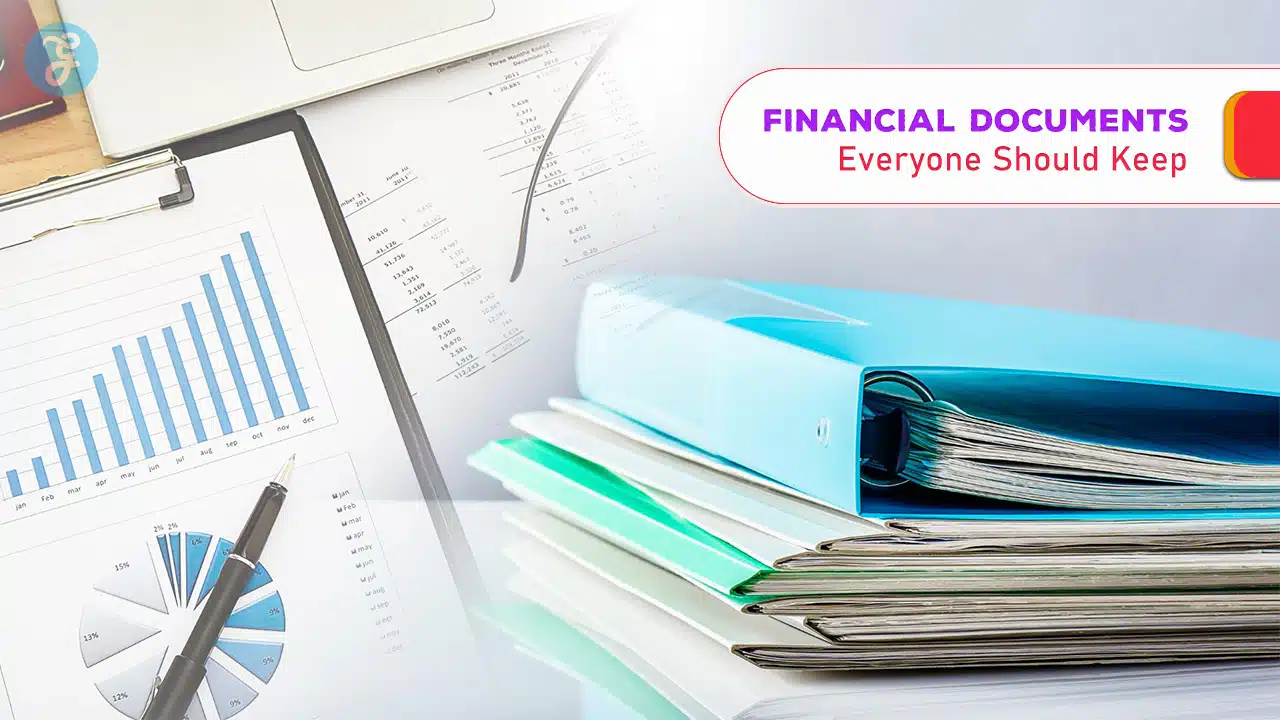In the complex world of personal finance, maintaining organized records is essential for ensuring financial stability, legal compliance, and effective management of your resources.
Whether you are preparing for tax season, managing investments, or planning for the future, having a well-organized collection of financial documents can make a significant difference.
These documents not only help you keep track of your financial activities but also provide necessary evidence in case of disputes or legal matters.
In this comprehensive guide, we will explore 15 critical financial documents that everyone should keep, discussing their importance, uses, and recommended retention periods.
1. Bank Statements
Bank statements are one of the most fundamental documents in personal finance management. They provide a comprehensive record of your account activity, including deposits, withdrawals, fees, and interest earned.
Regular review of your bank statements helps in monitoring your financial health, tracking spending patterns, and identifying any unauthorized transactions. These statements also play a crucial role in reconciling your bank account with your personal financial records, ensuring accuracy, and detecting any errors or discrepancies.
Recommended Retention Period:
It is advisable to keep bank statements for a period of 1 to 3 years. This timeframe allows for the review of transactions and the resolution of any issues related to account activity. However, you should keep statements for a longer period if they pertain to significant financial events or transactions, such as large deposits or withdrawals.
2. Tax Returns
Tax returns are vital documents that provide a detailed record of your annual income, deductions, and tax payments. They serve as a comprehensive summary of your financial situation for each tax year and are crucial for verifying your income, calculating taxes owed, and documenting your compliance with tax regulations.
Tax returns are also essential for addressing any questions or audits by tax authorities and for applying for loans or financial aid.
Recommended Retention Period:
It is recommended to keep tax returns for at least 7 years. The Internal Revenue Service (IRS) can audit returns within this period, and having these documents on hand ensures that you can address any discrepancies or provide necessary evidence if needed. Additionally, retaining tax returns for this period helps in verifying income and deductions for future financial planning.
3. W-2 and 1099 Forms
W-2 forms are issued by employers and report the total income you earned during the year, along with the amount of taxes withheld.
1099 forms, on the other hand, document income from non-employment sources, such as freelance work, investment earnings, or rental income. These forms are crucial for accurate tax reporting, ensuring that all sources of income are accounted for, and verifying your financial status.
Recommended Retention Period:
W-2 and 1099 forms should be kept for 7 years. This retention period aligns with the IRS’s statute of limitations for auditing tax returns and allows you to provide necessary documentation if discrepancies arise. Keeping these forms for this period also aids in verifying income and preparing for future financial planning.
4. Pay Stubs
Pay stubs provide detailed information about your earnings, withholdings, and deductions for each pay period. They are essential for verifying your income, tracking changes in your salary, and resolving any discrepancies related to your pay.
Pay stubs are also useful for applying for loans, mortgages, or rental agreements, as they serve as proof of income.
Recommended Retention Period:
Keep pay stubs for 1 year. This duration is generally sufficient for resolving any payroll issues or providing evidence of income when required. If there are significant discrepancies or issues with your pay, you may want to retain them for a longer period.
5. Investment Statements
Investment statements provide detailed information about the performance of your investments, including stocks, bonds, mutual funds, and retirement accounts.
They help you track the growth of your investments, calculate gains or losses, and evaluate your overall investment strategy. Investment statements are also essential for tax reporting, as they provide information on capital gains, dividends, and interest income.
Recommended Retention Period:
Retain investment statements for 7 years. This period allows you to track the performance of your investments, address any tax-related issues, and provide documentation for any discrepancies or financial planning needs. For significant investments or long-term holdings, you may choose to keep records for a longer period.
6. Retirement Account Statements
Retirement account statements document the contributions, growth, and withdrawals from your retirement accounts, such as 401(k)s, IRAs, or pensions. These statements are crucial for monitoring your retirement savings, planning for future retirement needs, and ensuring that your accounts are managed effectively.
They also help you track the performance of your investments and verify that contributions are being made correctly.
Recommended Retention Period:
Keep retirement account statements until retirement and beyond for historical purposes. Retaining these documents ensures that you have a complete record of your retirement savings and contributions, which is important for managing your retirement strategy and addressing any issues that may arise in the future.
7. Insurance Policies
Insurance policies provide detailed information about your coverage, including terms, conditions, premiums, and claims procedures. They are essential for verifying your coverage in case of claims or disputes and for renewing or updating your policies.
Insurance policies cover various types of insurance, such as health, auto, home, and life insurance, each of which has specific terms and conditions.
Recommended Retention Period:
Keep insurance policies for the duration of the policy and a few years after it expires. This period allows you to have access to coverage details when needed, such as when filing claims or addressing any disputes. For long-term insurance policies, such as life insurance, retaining documents for a longer period may be beneficial.
8. Property Records
Property records include documents related to the ownership, purchase, sale, and improvement of real estate properties. These records are crucial for verifying ownership, calculating property taxes, and addressing any legal issues related to property transactions.
They also help in determining the property’s value and history, which is important for selling or refinancing.
Recommended Retention Period:
Retain property records for the duration of ownership and beyond. This includes documents such as deeds, title reports, and records of major improvements or renovations.
Keeping these records ensures that you have a comprehensive history of your property, which is important for legal and financial purposes.
9. Mortgage Documents
Mortgage documents provide detailed information about your mortgage loan, including terms, interest rates, payment schedules, and balance. They are essential for managing your mortgage, refinancing, or selling your property.
Mortgage documents also serve as proof of your loan and payment history, which is important for financial planning and resolving any disputes.
Recommended Retention Period:
Keep mortgage documents until the mortgage is paid off and for a few years afterward. This period ensures that you have access to important information related to your mortgage, including the final payoff statement and any documentation needed for future reference.
10. Vehicle Records
Vehicle records include documents related to the purchase, registration, maintenance, and repair of your vehicles. These records are useful for managing your vehicle’s history, ensuring proper maintenance, and resolving any issues related to ownership or resale.
They also serve as proof of ownership and maintenance history, which can be important when selling or trading in your vehicle.
Recommended Retention Period:
Retain vehicle records for the duration of ownership and for a few years after selling or trading in the vehicle. This period allows you to keep track of maintenance and repair history, which is valuable for resale or legal purposes.
11. Estate Planning Documents
Estate planning documents include wills, trusts, powers of attorney, and other legal documents related to the distribution of your assets and management of your affairs in the event of incapacity or death.
These documents are crucial for ensuring that your wishes are carried out and for providing guidance to your heirs and executors.
Recommended Retention Period:
Keep estate planning documents indefinitely. These documents are essential for managing your estate and ensuring that your wishes are followed. It is also important to update these documents periodically to reflect any changes in your circumstances or preferences.
12. Receipts and Proof of Purchase
Receipts and proof of purchase provide evidence of transactions, including purchases, repairs, and services. They are useful for tracking expenses, returning items, and claiming warranties or rebates. Receipts also serve as documentation for tax deductions or business expenses.
Recommended Retention Period:
Retain receipts for 1 to 3 years, depending on their significance. For major purchases or items with warranties, keep receipts for a longer period. Receipts related to tax deductions or business expenses should be kept for at least 7 years.
13. Loan Documents
Loan documents include agreements, terms, and conditions related to personal loans, student loans, or other types of loans. These documents are important for managing loan payments, tracking balances, and addressing any issues related to loan terms or repayments.
Recommended Retention Period:
Keep loan documents for the duration of the loan and for a few years after it is paid off. This period ensures that you have access to important information related to your loan, including final payoff statements and any documentation needed for future reference.
14. Health Records
Health records include documents related to medical treatments, diagnoses, and insurance claims. They are essential for managing your health care, tracking medical expenses, and ensuring that your health insurance coverage is accurate.
Recommended Retention Period:
Retain health records for at least 1 to 3 years after the date of treatment or diagnosis. For significant health conditions or ongoing treatments, you may want to keep records for a longer period.
15. Business Documents
For those who own a business, 1099 forms, on the other hand, are used to report various types of income that are not subject to automatic withholding, such as freelance work, rental income, or investment earnings. Both W-2 and 1099 forms are essential for accurately reporting your income to the IRS and ensuring that you pay the correct amount of taxes.
Recommended Retention Period:
Keep W-2 and 1099 forms for at least 7 years. This period aligns with the IRS’s statute of limitations for auditing tax returns. By retaining these forms, you can provide evidence of income and tax payments if needed and ensure that you have a comprehensive record for future financial planning.
Takeaway
In today’s complex financial landscape, keeping organized and accurate financial documents is more important than ever. From bank statements and tax returns to estate planning documents and business records, each document plays a vital role in managing your finances, preparing for the future, and ensuring legal compliance.
By following the recommended retention periods and maintaining a well-organized system for your financial records, you can navigate financial challenges with confidence and secure your financial well-being.
Regularly review and update your document organization practices to stay on top of your financial affairs and make informed decisions for your future.











































